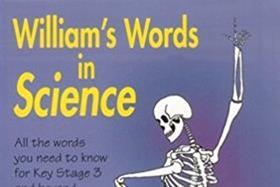Tony Tooth looks at some websites that may be of interest to chemistry teachers
Chemistry anecdotes
The, often quirky, stories on this site have been translated from Russian and could prove useful as extension work at KS4 or AS-level because they stimulate questions and alternative interpretations of commonly accepted ideas about the elements and the Periodic Table. One short story, for example, introduces the idea that there are 18 different kinds of water molecule, which could serve as a useful accompaniment to a lesson on isotopes. The only snag is that most of the titles of the 57 stories are somewhat obscure (but not always - Fourteen twins is about the lanthanides) so you will have to look at each one to identify which would work with your students.

Words in science
This website supports William's words in science, a useful dictionary/encyclopaedia for science at KS3 and above. The site includes some useful free resources to download such as word lists, which could form the basis of homework tasks, and pdf or Word format diagrams with or without labels. Those useful for chemistry courses include the nitrogen, water, rock and carbon cycles and a map of the Earth's tectonic plates. There are also some thought-provoking starters and plenaries as well as some crosswords for which students are prompted to write their own clues.
Science Museum
The classroom resources on the Science Museum site are neatly arranged into KS1, KS2, KS3 and KS4. The KS3 category has five sections, covering electricity and magnetism, energy transfer, light, materials, and science and engineering clubs. The materials section is of most interest for chemistry and includes a variety of videos and class activities supported by pdf documents for students. The videos are typically about three minutes long and include a demonstration of the properties of polymers and another of the properties of non-Newtonian fluids (silly putty). The activities include old favourites such as the burning £5 note, a demo of burning 'ice', an explosive extraction of silicon from sand and a 'soda snake' experiment.
Unfortunately, the KS4 materials section has no additional activities just six of the activities which also appear in the KS3 section. However, there are still enough useful and stimulating activities here to make the site well worth a visit for teachers of either level.






No comments yet